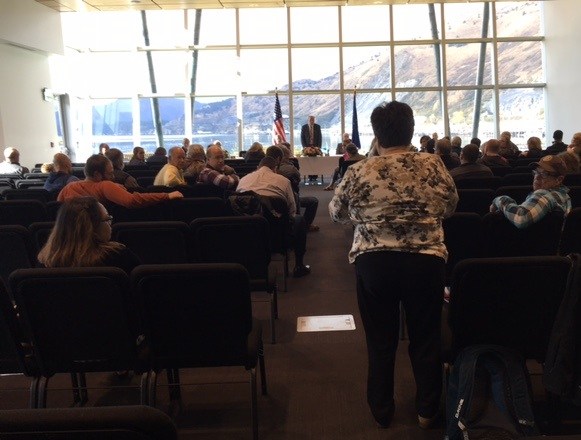
Alaska is one state where the public has relatively easy access to its elected officials, and Gov. Bill Walker put some time aside to speak with the community during a visit to Kodiak on Friday.
The Chamber, the Afognak Native Corporation, and the City of Kodiak hosted a state update at the Afognak building and reserved time to hand the mic to members of the audience.
Julie Bonney asked the governor about funding the Department of Fish and Game. She said every time the state cuts the department, Alaska loses research and management programs, which results in fewer jobs and less income.
“Understanding that the legislature cannot dedicate funds, what can you do to ensure any new tax revenues generated from this industry would be used to cover the general fund gap for Fish and Game and pay for Fish and Game management?”
Walker acknowledged the importance of Fish and Game to fish management and data collection, and said the legislature is trying to cut departments without doing damage to one in particular.
“So, we’re very, very mindful of that,” he said. “We hate to have any financial burden on any industry at all, but the way it seems to work is that – such as the mining industry. The mining industry said, we’re willing to pay a little bit more, but make sure those fishermen pay a little bit more. We talked to the fishermen and some of them said, we’ll pay a little bit more, but make sure those miners pay a little bit more.”
As an example of how the state is trying to help the fishing industry,
Walker said his office just issued a declaration of disaster for the bad pink salmon season. That was an initiative which originated with Rep. Louise Stutes in Kodiak.
Denise May, the chairwoman of the Afognak Board of Directors, later asked a follow-up question about the declaration. May said she’s particularly concerned about rural communities, crew members, and cannery workers, and asked how the state can ensure the federal government provides money to help those members of the fishing industry. Walker said the Alaska delegation will help advance the issue in Washington D.C.
“We’ll work with the administration to see what we can do to move that process along, and I know that it’s just begun, but we still have a few more months up until January with this administration, so we’ll do all we can to push that along, and we do have very good relationships with the White House on that, so we’ll push as hard as we can.”
Larry Van Daele, a retired Fish and Game employee, turned the conversation to natural gas. He asked Walker why he feels it’s so important to press the natural gas pipeline in a time of economic uncertainty.
Walker’s answer suggested he considers it a possible solution to some of the state’s fiscal problems.
“If the market is not interested, it will not happen. If the market is interested and it happens, it’ll be a phenomenal get well card for Alaska,” Walker said. “I mean, it would be absolutely phenomenal. The oil pipeline created 70,000 jobs, this would probably create about 30,000 jobs for about a five-year, six-year period of time, bring down the cost of energy.”
He explained that monetizing that resource would bring in a lot of extra revenue.
The governor spent the majority of the meeting responding to audience questions and comments.
Afterwards, he headed to a joint work session between the Kodiak Island Borough Assembly, the Kodiak City Council, and the school board.
While he had originally planned to stay for the Chamber of Commerce annual dinner that night, he announced earlier in the week that he was unable to attend and flew off island Friday night.
